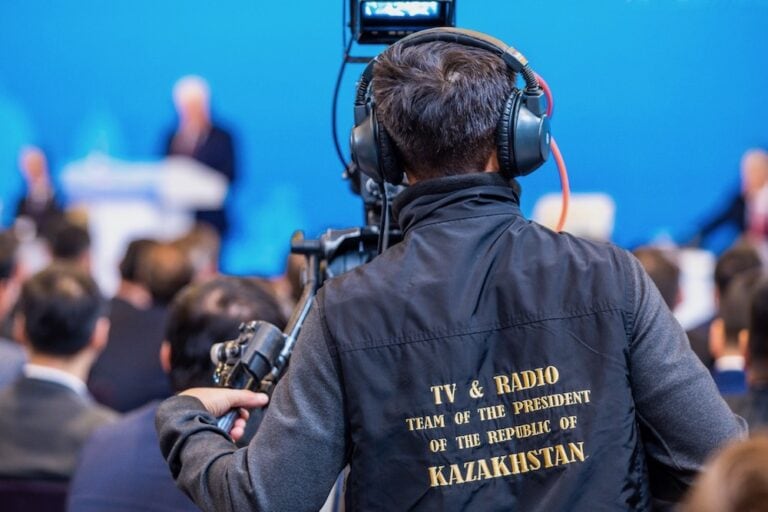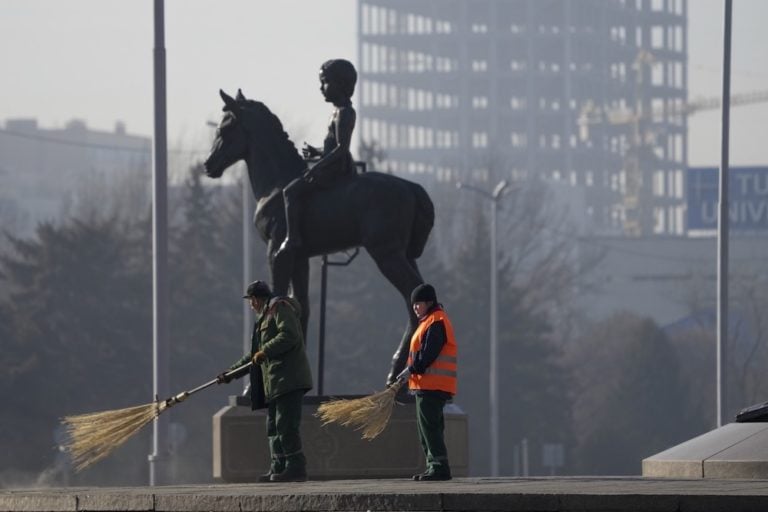(RSF/IFEX) – RSF has denounced the prison sentence imposed on opposition journalist Sergei Duvanov on 28 January 2003 as “legally insignificant” because of numerous irregularities. The organisation suggested the sentence was part of the Kazakh government’s ongoing repression of the media. An Almaty court sentenced Duvanov, editor of the opposition magazine “Bulletin”, published by the […]
(RSF/IFEX) – RSF has denounced the prison sentence imposed on opposition journalist Sergei Duvanov on 28 January 2003 as “legally insignificant” because of numerous irregularities. The organisation suggested the sentence was part of the Kazakh government’s ongoing repression of the media.
An Almaty court sentenced Duvanov, editor of the opposition magazine “Bulletin”, published by the International Bureau for Human Rights, to three and a half years’ imprisonment for allegedly raping a minor. The prosecution was seeking a seven-year sentence, but the judge ruled that the defendant did not know the age of the victim.
“The repression that Duvanov and all of Kazakhstan’s independent and opposition media are subjected to by President Nursultan Nazarbayev’s regime would suggest that this case is politically motivated,” said RSF Secretary-General Robert Ménard. “We expected that the authorities would grant him a fair and open trial, but the many irregularities in the investigation and constant violation of defence rights during the trial means the conviction has no legal value.”
Duvanov was arrested on 28 October 2002 and accused of raping a 14-year-old girl. He had been due to fly the next day to the United States to present a report on democracy and human rights in Kazakhstan. He went on hunger strike for 10 days in a bid to prove his innocence. At a press conference at the European Commission in Brussels on 29 November, President Nazarbayev said Duvanov’s guilt had been proved.
The journalist’s trial opened on 24 December, but his lawyers were not allowed to examine the entire case file. Concluding that the trial was a farce, Duvanov dismissed his lawyers from the case on 23 January, one day after the court rejected their application for the charges to be dropped because of a lack of proof and many legal irregularities.
Duvanov’s lawyers said he turned his back in protest when the verdict was read out. One of them, Yevgeny Zhovtis, told RSF that the trial was “a provocation” since no proof of guilt had been presented and “basic legal principles were not respected.”
The journalist is one of the government’s strongest critics and regularly denounces the harassment of independent media and the opposition. He is also being prosecuted for “harming the honour and dignity” of President Nazarbayev. On 28 August, he was beaten up by thugs and badly injured (see IFEX alert of 30 August 2002).
During a fact-finding mission to Almaty in July, an RSF representative met several times with Duvanov, who spoke of the authorities’ intimidation tactics and legal harassment. He said they would probably accuse him in a sex or drugs scandal. “I’m still free and in good health,” he said, “but this can’t last.”
Local human rights groups and opposition journalists say political opponents are regularly discredited by the secret police to intimidate them or make them talk.
RSF recalls that Artur Platanov, a political journalist for the independent television station KTK, was badly beaten in Almaty on 16 August (see IFEX alert of 19 August 2002). In addition, the daughter of Lira Bayseitova, editor of the opposition weekly “Respublika”, died on 21 June in suspicious circumstances while in police custody (see IFEX alerts of 13 December, 29 August and 2 July 2002).


